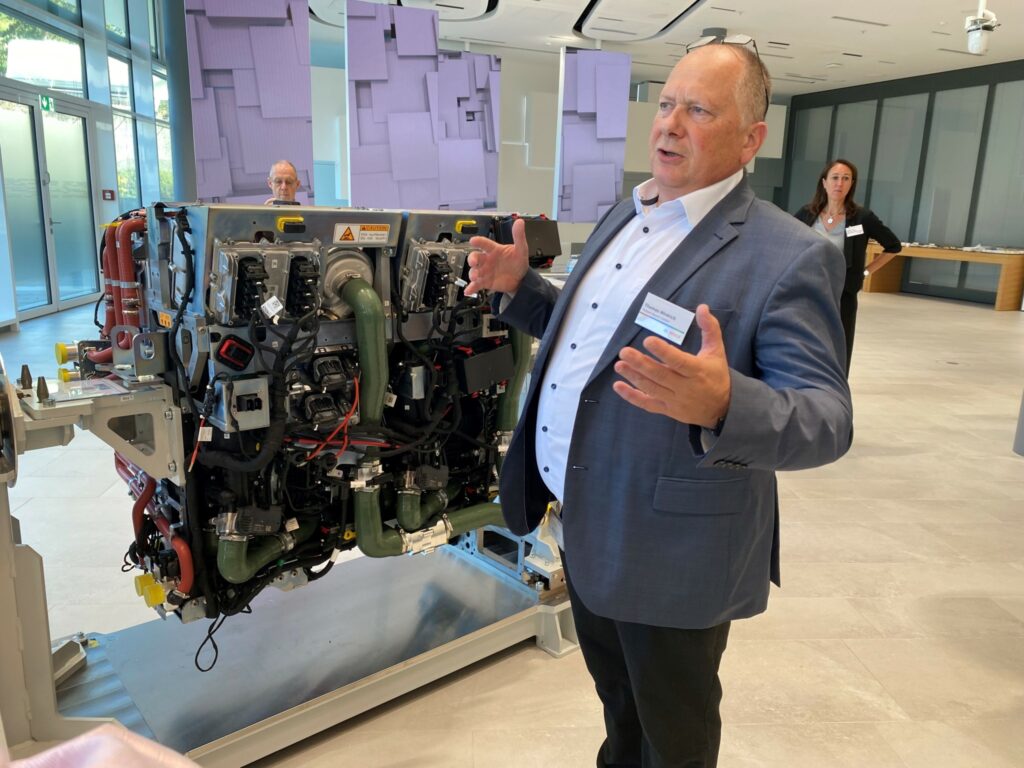Bosch sees clear skies for hydrogen as key to transport decarbonization
Global automotive supplier Bosch is betting heavily that hydrogen fuel cells will have a major role to play in the decarbonization of transportation.
The company showcased some of its investments in this field during a visit to its Stuttgart, Germany headquarters by North American truck and automotive journalists following the IAA Mobility show in Munich.

“We see real use cases where it’s favored to use hydrogen instead of other alternatives,” said Dr. Thomas Wintrich, senior vice-president, fuel cell mobility solutions business unit. “There is not one technology which would serve all. We see electrified powertrains with batteries, we see hydrogen [internal combustion engines] and we see for sure fuel cell mobility solutions.”
Wintrich said Bosch has embedded itself within the entire hydrogen value chain. It is producing hydrogen fuel cells for heavy trucks, and in North America licensed production of those cells to Nikola for use in its own vehicles. It is also developing electrolysis stack and components for electroyzers that will be used to produce the hydrogen itself.
“Bosch is in the entire hydrogen value chain: production, storage and distribution and usage,” Wintrich said.
The company has also entered into the water purification business, so that it can produce hydrogen without the use of drinking water. Carola Ruse, product vice-president, PEM (proton exchange membrane) electroyzer, said the company is installing water purification at sources of water where it can be used to produce hydrogen. It takes about 9 kg of pure water to produce 1 kg of hydrogen through electrolysis.
Bosch’s containerized system, which will enter production in 2024, will be able to purify salt water or other unclean sources for hydrogen production.
“The purification of sea water is our future vision,” Ruse said.
Picture a windmill erected in the sea, which takes in sea water, purifies and electrolyzes it, to produce clean hydrogen out a pipeline on the other side.
“No chemicals. It’s ecologically friendly and low maintenance,” Ruse explained.
Looking further out, Bosch’s PEM electrolysis stack is currently in development and will enter production in 2026. The electrolysis market is expected to grow by 60% annually. The pursuit of green mobility will drive this market, and Wintrich said China is currently leading the world with 280 hydrogen fueling stations expected to reach 5,000 by 2030.
Bosch plans to build fuel cell stacks for the North American market at a plant in Anderson, S.C., beginning in 2026. It has developed a way to recover 95% of the platinum contained within the units at end of life, which will be recycled and put into new fuel cell stacks. Such recycling efforts will slash the CO2 emissions caused by fuel cell stack-related platinum mining by 95%, the company says.
Bosch anticipates that one in five heavy-duty trucks in the U.S. will be hydrogen-fueled by 2030. About 1,000 hydrogen fueling stations will be required to support those trucks, which would equate to a station every 80 km or so.
When it comes to fuel cell stack production, Bosch feels it has a key advantage over other producers. It uses more than 1,200 meters of welds in each stack to make it hydrogen-tight. In Europe, Bosch is supplying Iveco heavy-duty trucks with hydrogen fuel cells. Those trucks can carry up to 70 kg of hydrogen on-board, enough to travel about 800 km between fueling stops.
Have your say
This is a moderated forum. Comments will no longer be published unless they are accompanied by a first and last name and a verifiable email address. (Today's Trucking will not publish or share the email address.) Profane language and content deemed to be libelous, racist, or threatening in nature will not be published under any circumstances.
More Hydrogen News.